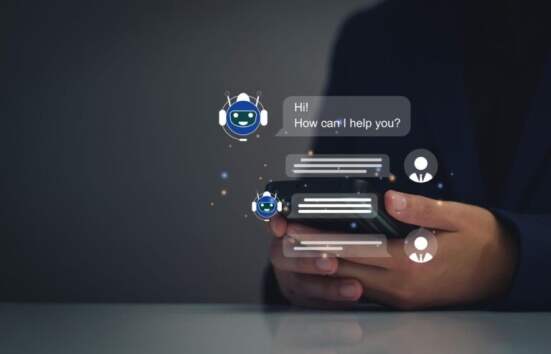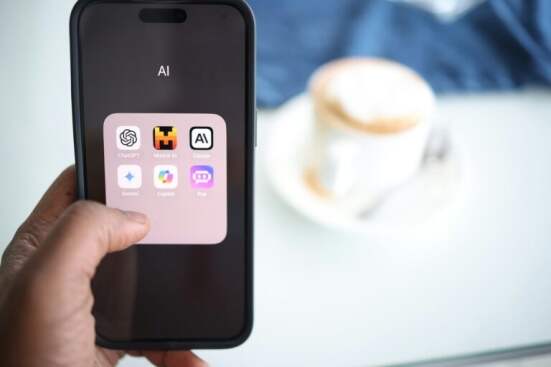While ChatGPT’s top brass have previously refuted the idea of ads on the AI platform, they’re now hinting that it might be in the forecast. Here’s what we know so far, what we predict, and what it could mean for digital marketers.
ChatGPT was the first generative AI tool to reach mass adoption, “giving millions of people around the world a taste of what large language models are capable of,” according to data journalist Felix Richter.
As this platform and others like it continue to iterate, evolve, and expand their user bases, it’s hard to know what the future holds when it comes to how artificial intelligence will continue to be implemented into our lives.
One question many digital marketers have is: Does the future of AI include ads?
Despite OpenAI CEO Sam Altman previously saying that he’s resistant to ads on ChatGPT, he’s now changed his tune to saying he’s “not totally against it.”
To learn more about what may be coming down the pike in terms of AI and digital marketing, we spoke with HawkSEM co-founder and CEO Sam Yadegar.
Read on to see what he has to say about this potential evolution, what it could mean for marketers, and how we can do our best to be prepared for whatever comes next.

As for how ads and campaigns would surface on AI platforms, “It’s hard to say exactly, but it’ll probably look very different from traditional ads,” Yadegar says. (Image: ALAKA/Adobe)
Will ChatGPT start showcasing ads?
“The internal projections [are] showing potential billion-dollar revenue from ‘free user monetization,” says Yadegar.
“MarTech and Search Engine Land suggest they’re definitely considering it. The resistance probably comes down to user experience concerns.”
He adds that serving ads on ChatGPT could certainly change how people interact with the platform. Considering the costs of running these AI models, Yadegar isn’t surprised that some form of monetization is being considered.
As for how ads and campaigns would surface on AI platforms, “It’s hard to say exactly, but it’ll probably look very different from traditional ads,” Yadegar says.
“Maybe sponsored suggestions [will be] tastefully woven into conversations, or contextual recommendations [will be provided] that feel more natural.”
He adds that the platform understands user intent really well, so ads could potentially feel more helpful than intrusive. But, he says, “we’re really in uncharted territory here.”
How to prepare for a possible future with AI platform ads
While so much is uncertain about this topic, for now, one of the main questions centers around what digital marketers should be thinking about and paying attention to as this idea develops.
According to Yadegar, “We should all be thinking about conversational marketing rather than just keywords. How would your brand sound in a natural conversation?”
He says it might even be worth building content for ChatGPT users and those on other AI platforms now, even before advertising options exist.
Expert tips for AI advertising
One mistake we often see is that companies will simply repackage campaigns for different platforms, rather than approaching each one individually.
But a strong Google Ads campaign won’t necessarily have the same success on a social media platform like Facebook Ads – the same goes for AI.
“Don’t assume your current strategies will just transfer over [to AI platforms],” Yadegar cautions. The strategies you currently use for PPC or social campaigns might not apply here at all. “We’re all figuring this out as we go.”
He suggests avoiding being too pushy or obviously promotional, similar to our advice for Reddit Ads. After all, people expect helpful responses from AI, not sales pitches.
Feeling overwhelmed by all the information above? Understandable! But the truth is, when it comes to ChatGPT ads, there’s a lot we don’t know.

LLMs are the AI systems put in place to generate prompt responses that have human-sounding text, so it appears less like you’re getting answers from a bot. (Image: Solen Feyissa/Unsplash)
Breaking down ChatGPT and learning language models (LLMs)
ChatGPT is an AI-powered chatbot developed by the team at OpenAI. The platform leverages generative artificial intelligence to respond to prompts and questions. It’s powered by OpenAI’s exclusive GPT roster of gen AI (generative artificial intelligence) models.
GPT stands for Generative Pre-trained Transformer, which “is basically a description of what the AI models do and how they work,” according to Zapier.
So, where does the LLM come into play? Well, LLMs are the AI systems put in place to generate prompt responses that have human-sounding text, so it appears less like you’re getting answers from a bot.
The ways people are using ChatGPT and other AI agents are virtually endless – it can do everything from meal planning and travel itinerary creation to image generation and everything in between. Many use it in the same way they use Google Search or another search engine.
The takeaway
“AI ads in general could be the most sophisticated and relevant form of ads we’ve seen in a while,” says Yadegar. “OpenAI’s bold vision for ChatGPT seems poised for a familiar business model: ads that drive value for users as well as advertisers.”
The AI community seems to value authenticity and valid responses, so whatever digital advertising emerges will need to feel genuinely useful, he adds. It’s going to be interesting to watch how it all develops.
Want more help with your current (and future) digital marketing goals? We’re here to help.
